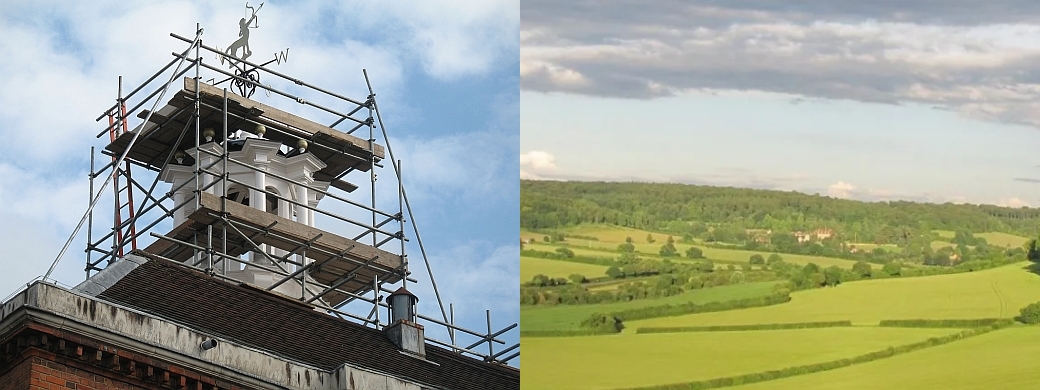

previously published on March 10th, 2019
Yesterday I was accosted by a big black woman of mature years on a corner of the Desborough Road—that village pump, that microcosm of this glorious world, a few stones’-throws away. She was not unbeautiful, the sidewalk was not wide, she only needed to stand there to slow my pace. She beamed as though I was the best thing she’d seen all day. I modestly accepted the judgement, smiled back with a twinkle in my eye.
With her right arm she held a placard close to her chest, didn’t wish to display it. In her left hand she waved a glossy paperback. It had a garish cover. She conveyed that we are in the end times, and we need to know what the Book of Daniel has to tell today’s world, as written only in this book. In order to make sense of this, I asked if she was selling the book for money, or perhaps inviting me to her church. There are premises used by the Seventh-Day Adventists and Pentecostals just yards away. They both serve mainly black congregations.
Neither of those. So again, trying to reach the heart of the matter, I asked was it because she’s a believer and wanted to tell me for my own good? Yes. We were buffeted by a howling wind, and she was getting hoarse. I guessed she must have given her pitch to many ungrateful passers-by already. Bless you, I said, please don’t lose your voice on my account. No disrespect, but I make up my own mind about things, it’s no good telling me what to believe. I shall read the book of Daniel for myself to see if I find a message there that’s for me in this age, I promise. I lightly touched her arm, said bless you again and hurried home in the biting wind. Having both done our Christian duty, we parted gladly.
And so this morning I felt honour-bound to read the book of Daniel, and see if it speaks words that unlock the secret meaning of what’s going on today.
I consulted my Bible Designed to be Read as Literature. Didn’t find it in Part I, Historical Books, nor in Part II, Prophetical Books. Part III is headed Poetry, Drama, Story and Philosophy. There I finally found Daniel: A Tale, surely one of the raciest stories in the Bible, as in
racy: having a characteristic vigour, liveliness, or piquancy.
Daniel and others of the children of Israel captured in Babylon have been handpicked as bright youths and placed under stewardship of King Nebuchadnezzar’s head eunuch, to be given meat & wine “from the King’s table” to make them healthy & fit to be courtiers of the King. Daniel is faithful to his own traditions and insists on a meagre diet of pulse for himself and three friends. Nevertheless their countenances appear fatter and fairer than others who indulged in the best that Babylon could offer. The King gives Daniel and his friends new Babylonian names: Shadrach, Mesach and Abednego: names lodged in my own memory from when I was nine years old.
The King has a dream and wants to know from the magicians, astrologers, sorcerers and Chaldeans what it means. Since he cannot remember the dream to tell them, none dares respond: it can’t be done! The King has one way to command respect. He threatens to have them all killed, plus all the captive children of Israel, if nobody obeys him. Draconian.
The men come for Daniel’s execution. What has he got to lose? He pleads “Take me to the King”, concocts an elaborate dream and offers an interpretation. The King is delighted, appoints him to high office over the realm. Ignoring his interpretation, the King makes a huge image of gold for everyone to bow down and worship, whenever they hear the sound of “cornet, flute, harp, sackbut, psaltery, dulcimer and all kinds of music”.
 I’m reminded of Jacques Loussier, who died 5 days ago. Not a famous name compared with all the pop musicians of the last 50 years but his jazz version of Bach’s “Air on a G-string” is remembered with affection from a series of ads on TV for Hamlet Cigars
I’m reminded of Jacques Loussier, who died 5 days ago. Not a famous name compared with all the pop musicians of the last 50 years but his jazz version of Bach’s “Air on a G-string” is remembered with affection from a series of ads on TV for Hamlet Cigars
Such is the power of Babylon, aided with sweet music, in the worship of false gods.
So Daniel and his pals refuse to bow down. Shadrach, Meshach and Abednego are consigned to a fiery furnace and come out unscathed, uttering a song of praise we used to sing as a canticle every Sunday in church called Benedicite Omnia Opera:
O All ye Works of the Lord, bless ye the Lord: praise him, and magnify him for ever
…
O ye Fire and Heat, bless ye the Lord: praise him and magnify him for ever
…
—and so on for about 40 verses. Now I’m reminded of Karleen’s Aunt Avis, the best Christian I know, so full of love & care for everyone. She’s in pain now and can’t walk upstairs any more. The more she suffers the more she praises the Lord. I find this makes perfect sense.
So anyhow, Nebuchadnezzar is so impressed by the escape from the fiery furnace that he is converted to their God, or so he says: anyone who badmouths their God of Israel, he’ll have them cut in pieces, then their houses will be trashed. And then the King has another dream: that he’ll be deposed and exiled to live with the beasts of the field and eat grass. This actually happens, but with his dying breath he remembers to honour the name of the Most High.
He’s succeeded by his son Belshazzar, who learns nothing from his father’s fate, but has a great feast, sporting the precious vessels his father had stolen from the temple in Jerusalem. All his princes, wives and concubines are there. They drink wine and offer praise to the graven images of gold, silver, brass, iron, wood and stone.

This is where a hand appears, writing on the wall “Mene Mene Tekel Upharsin”: more strange words that stick in a child’s memory for life. What can it mean? The magicians, astrologers, sorcerors and Chaldeans haven’t a clue, yet again. Only Daniel can tell them, and gets the promised gown of scarlet with a gold chain as reward. “It means you’re done for,” he tells Belshazzar, who gets killed that very night, so that Darius can take over as King.
Thus it goes on, with repeated phrases and episodes like many other oral legends. Near the end, Daniel delivers his memoirs, and tells of more visions. In the last of these the archangel Michael tells him to shut his book of memoirs and seal it, until the end-time when all will be revealed.
Now I can make sense of what the big black woman told me. We are in the end-time, she said. Will I see her again? How can I get hold of her book? I can’t find it on Google.


The story of Nebuchadnezzar’s dream of the statue was one of my favorite stories from the Bible when I was a kid. As I recall, the interpretation was that the different layers of the statue, the different metals involved, represented all the coming kingdoms of the world. The future history of humanity was laid out in this statue.
I like your take on it, that he concocted the dream out of his imagination and sold the king on the idea that it was the dream he had forgotten. The understanding when I was a kid was that Daniel was so good that he not only interpreted the dream, he even remembered it for the king!
LikeLike
I was brought up in a sect called the Disciples of Christ. It originated on the American frontier and preached a kind of no-frills Christianity to pioneers who had no contact with organized religion except maybe a visit from a circuit rider once a month.
The church’s motto was: “No Book but the Bible, No Creed but Christ.” We children were taught that the New Testament superseded the Old Testament, and the Gospels outweighed everything else in the Bible.
I once shared this with a (white) friend who’d been brought up a Plymouth Brother. He said that when he was a child, he was taught that the most important parts of the Bible were the prophecies in the Book of Revelations and Book of Daniel.
Christianity is more than just one thing.
LikeLiked by 1 person
It certainly is! I’m grateful that the two (private) schools I attended made Scripture into an essential lesson, so that we ended up knowing the Bible, without forcing Christianity upon us. The Church of England was simply a given, an non-evangelistic cultural environment that helped prepare us for “service” – Queen, Empire, armed forces, church maybe – or mercantile life. I argued intellectually with Christianity & “militarism” without deviating from expected behaviour.
LikeLiked by 3 people